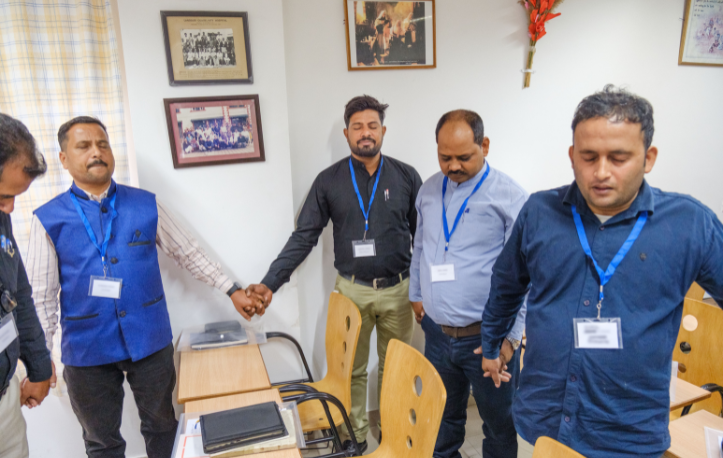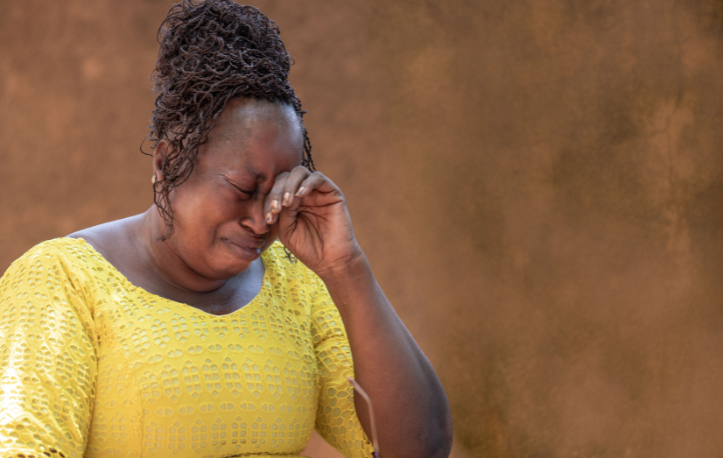In the 1990s, Zamir’s life started spiralling out of control. After losing his parents at a young age, he married in his early 20s only to see his wife die while giving birth to their first child, a baby boy, who also died. Depressed, struggling with alcoholism and angry at Allah, Zamir had reached a low point and needed income to support himself. Around that time, he was recruited to smuggle weapons for fighters on one side of Yemen’s 1994 civil war, which lasted two months. Desperate for money, he took a job transporting guns between his town and the large port city of Aden, on Yemen’s southern coast. On one of their trips to pick up a shipment of weapons, 25-year-old Zamir and his colleagues were arrested for smuggling, for which they each received eight-month prison sentences. When Zamir’s siblings learned of his crimes, they refused to talk to him.“I felt sad and alone,” he said. While in prison, Zamir reached a new depth of despair.
A Light in the Darkness
The prison guards brutally beat Zamir and his friends, leaving them with scars and injuries that caused lasting pain. In addition, the hard floor Zamir slept on aggravated a back injury he had suffered years earlier in a car accident. Authorities offered Zamir an early release if he could pay bail, but he had no family support and could not come up with the funds on his own. Eventually, however, he received hope in the most unexpected way — through the ongoing torture. As the guards continued to beat him regularly, Zamir’s wounds required medical care. Authorities allowed doctors and nurses connected with local churches to provide care to inmates once a week under the watch of the guards, who made sure their own abusive treatment was never revealed.
During one of these visits, a nurse named Eva treated Zamir’s back pain. Although she was from Europe, she spoke fluent Arabic as a result of living in Yemen for several years. While working with Zamir, Eva cautiously asked questions about his health. She also asked for his family address, explaining that she wanted to persuade them to provide Zamir’s bail. A month later, when Eva brought Zamir a brace for his back, she told him that his siblings still wanted nothing to do with him. “Don’t worry,” Eva reassured him. “I will try to help you.”
Ready to Party
One morning, the prison warden called Zamir to his office. When he walked into the room, Zamir was surprised to find Eva waiting for him … and even more surprised to learn that his bail had been paid. After several months in prison, he was suddenly free. Eva arranged for Zamir to attend her church that evening. Although he didn’t know what to expect from the church service, he looked forward to it. Based on what he had heard of Christian worship as a Muslim, he expected it to be a party with an abundance of alcohol and promiscuous women.
He showered, ate lunch and eagerly awaited the church service, which started at 7pm. As he arrived at the church, Zamir could hear loud music. He couldn’t wait to party after spending months behind bars.“I felt like, ‘Here is my night!’ you know?” Zamir recalled. “Then [a man] opened the door, and there is this old lady on the keyboard and really old people inside. There was no whisky or any other drinks. Nothing.” He became even more disappointed when an elderly man began to pray and teach from the Bible in English. Zamir couldn’t understand a word he was saying. “I was shocked,” he said. “I didn’t know what happened at a church. I felt like church was a nightclub or something.”
Eva introduced Zamir to the pastor, and after Zamir shared his story with him the pastor offered him help. “You can stay here,” the pastor said. “We have a clinic with a pharmacy here; you can help in the pharmacy.”As they worked in the pharmacy together, Zamir and Eva discussed faith and the differences between the Bible and the Koran. When Zamir admitted that he had never read the Bible, Eva gave him one.“I was excited to get the Bible because it is illegal in Yemen,” Zamir said. Although he eagerly received his copy of the Bible, Zamir put it on a bookshelf and forgot about it.
Learning to Trust
One day, Zamir accompanied Eva as she visited one of her patients. As he waited in the car, he noticed an Arabic New Testament beneath his seat. He opened it and read a passage from the Sermon on the Mount, in which Jesus teaches his followers to love their enemies. “My head became heavy when I read that because it was like I saw a movie in front of me,” Zamir recalled. “All the people in my life were in front of me, and this book said, ‘Love them.’ That was not easy to read.”
When Eva returned to the car, Zamir didn’t say anything about what he had just read. But when he got home, he went straight to his bookshelf and grabbed the Bible Eva had given him. “I read it from that afternoon until the next morning,” Zamir said. After encountering Jesus Christ through God’s Word, Zamir felt conflicted about the teachings of Islam. “I had never seen such an image of God in all my life,” he said. “Before, I was afraid of God. He killed people and put people in hell. I never saw this part of God. He is love. If I am guilty, he accepts me. [Before] that time, I felt very guilty, but I felt nobody would accept me.”
The next morning, Zamir rushed to find Eva and told her he wanted to become a Christian. “I love Jesus,” he told her. “I love his character. I can’t explain it to you more than that, but his character is amazing.” After Eva explained more deeply what it means to become a Christian, Zamir placed his faith in Christ. As they continued discussing the Christian faith, Eva responded to his questions about Jesus and the Bible by having him read particular passages of Scripture. Soon, Zamir started attending church regularly, despite the risk of his Christian faith becoming unknown. In Yemen, leaving Islam for another religion is considered apostasy, which is punishable by death. One day, Zamir asked Eva why she took the risk of giving him a Bible and telling him about Christ. “I felt inside my heart to trust you,” Eva replied.
Forced Out
While walking to the clinic one day, Zamir noticed a car following him. Thinking it was probably the police, he started running and was able to get away from the car. The next day, he learned that authorities had revoked Eva’s visa and expelled her and other foreigners from the country. Assuming that the authorities had been watching him and would pursue him for becoming a Christian, Zamir fled to Aden. He didn’t stay long, however, and soon moved back home to take possession of property inherited from his parents. When he arrived at his childhood home, he put his luggage in his old room and left the house. While Zamir was away, his oldest brother opened his suitcase and found his Bible. When Zamir’s brother later confronted him about the Bible, Zamir explained that he had become a follower of Christ. Angered at Zamir’s shocking admission, his brother told Zamir he would kill him if he didn’t return to Islam.
Gaining an Audience
In the new country, Zamir met some believers working for a Christian radio ministry. After telling Zamir about their plans to start a Yemeni radio station using the Yemeni dialect, they offered Zamir a job on the spot. He took the job and began hosting a radio show in which he reads Scripture and takes questions about the Bible. The radio broadcasts make God’s Word more accessible inside Yemen and also help believers like Zamir who have fled Yemen and now live in nearby countries. Some of the Muslims who call Zamir’s show are critical and even aggressive. He uses those calls as an opportunity to share the love of Christ over the airwaves. “Then they start to become more relaxed,” he said. Whenever he speaks with new believers through the radio programme, he makes sure they understand that it is likely they will face persecution. “I don’t want anyone to make this decision before they understand the cost, as Jesus did with the rich man,” he explained. “[Jesus] told them, ‘If you want to follow me, go and sell everything.’ You don’t come to Jesus and your life is beautiful. It’s nothing like that. When you come to Jesus, you have to be ready. There is a cross on your shoulder; there is a cost you have to take. Sometimes it’s your life, sometimes it’s your country, sometimes it’s your family.”
In recent years, Zamir has reconnected with Eva. She stumbled across a Christian radio station broadcasting in the Yemeni dialect while on holiday and sought information about the programme’s
producer. To her surprise, she learned that it was Zamir. When Zamir and Eva met again for the first time in several years, they celebrated how God brought Zamir to Christ and has been using him for more than a decade to help spread the gospel in Yemen.




Submit a Prayer